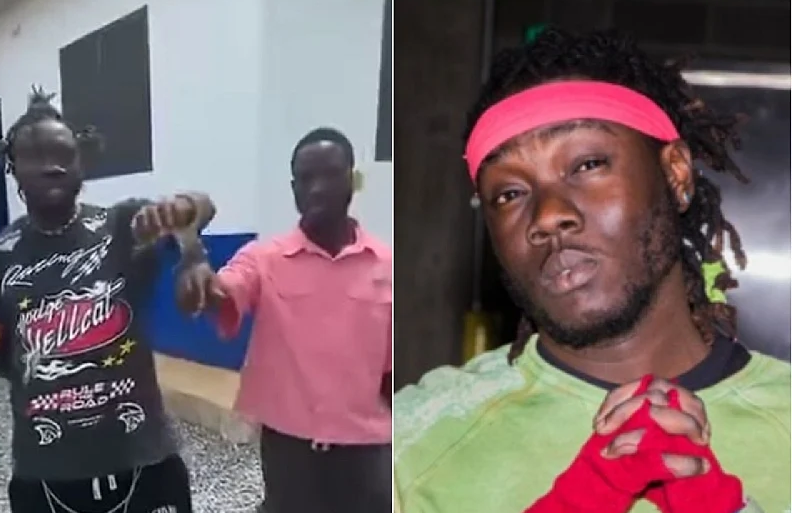The Ghanaian music scene was recently shaken by the arrest of artiste Showboy, whose real name is Sam Kwabena Safo Junior, following an altercation during a performance in Akim Oda. A video circulating on social media platforms depicts Showboy in handcuffs alongside another unidentified individual, confirming the arrest. The incident reportedly stemmed from a confrontation between Showboy and fellow artiste Kay Tee, accompanied by an associate, during Showboy’s performance. Although the precise details leading to the physical altercation remain unclear, sources suggest that Showboy was allegedly attacked by Kay Tee and his companion. Instead of seeking legal recourse by reporting the assault to law enforcement, Showboy purportedly retaliated by biting one of his attackers on the ear. This act of self-defense, while understandable in the heat of the moment, appears to have been the catalyst for his subsequent arrest.
The circulating video offers a glimpse into the aftermath of the incident. Showboy, visibly restrained in handcuffs, uses the opportunity to address his viewers directly, offering counsel against resorting to violence. Ironically, his own predicament serves as a cautionary tale. Speaking from experience, he emphasizes the importance of navigating assault cases through established legal channels rather than resorting to self-defense or retaliation, regardless of the provocation. He underscores the potential legal ramifications of taking matters into one’s own hands, highlighting the possibility of a two-week jail sentence for his actions. He repeatedly urges his audience to prioritize reporting any wrongdoing to the police, emphasizing that this is the appropriate and legally sound course of action in such situations.
Showboy’s arrest and subsequent video message sparked widespread discussion within the Ghanaian music community and beyond. The incident raises several crucial points concerning conflict resolution, the appropriate use of self-defense, and the role of law enforcement in mediating disputes. While Showboy’s act of biting his attacker might be viewed by some as a justifiable response to physical aggression, his arrest underscores the legal complexities surrounding self-defense. The law typically requires that self-defense be proportional to the threat faced. Whether Showboy’s reaction met this criterion is a matter for legal determination, but his detention suggests that authorities deemed his response excessive.
The incident also highlights the broader issue of violence within the entertainment industry, particularly in the often-competitive music scene. Rivalries and disputes are not uncommon, but the escalation to physical violence underscores the need for conflict resolution mechanisms within the industry. Perhaps this incident can serve as a catalyst for dialogue and initiatives promoting peaceful resolution of disputes among artists. Moreover, the situation serves as a reminder of the importance of emotional regulation and impulse control, particularly in high-pressure situations. While the impulse to retaliate in the face of aggression is understandable, Showboy’s experience demonstrates the potential negative consequences of acting on that impulse.
The video itself, while ostensibly documenting Showboy’s arrest, transforms into a public service announcement advocating for peaceful conflict resolution. This unplanned transformation adds a layer of irony to the situation. While in custody and facing potential legal repercussions, Showboy becomes an advocate for legal recourse and a proponent of the very system that has apprehended him. This unexpected turn highlights the complexities of his situation and the potential for personal growth and reflection even within challenging circumstances. Showboy’s message, delivered from a position of vulnerability, resonates with a raw authenticity that likely wouldn’t have been achieved through a more conventional platform.
In conclusion, Showboy’s arrest serves as a multi-faceted case study with implications extending beyond the immediate circumstances. It underscores the importance of legal avenues for addressing assault, the potential pitfalls of self-defense, the need for conflict resolution mechanisms within the entertainment industry, and the power of personal reflection and growth even in the face of adversity. While the legal proceedings and eventual outcome of Showboy’s case remain to be seen, the incident has undoubtedly sparked a necessary conversation about violence, self-defense, and the pursuit of justice within the Ghanaian music scene and wider society. His video message, delivered from the confines of handcuffs, serves as a poignant reminder that resorting to violence rarely solves problems and often exacerbates them, potentially leading to further legal complications and personal hardship.














